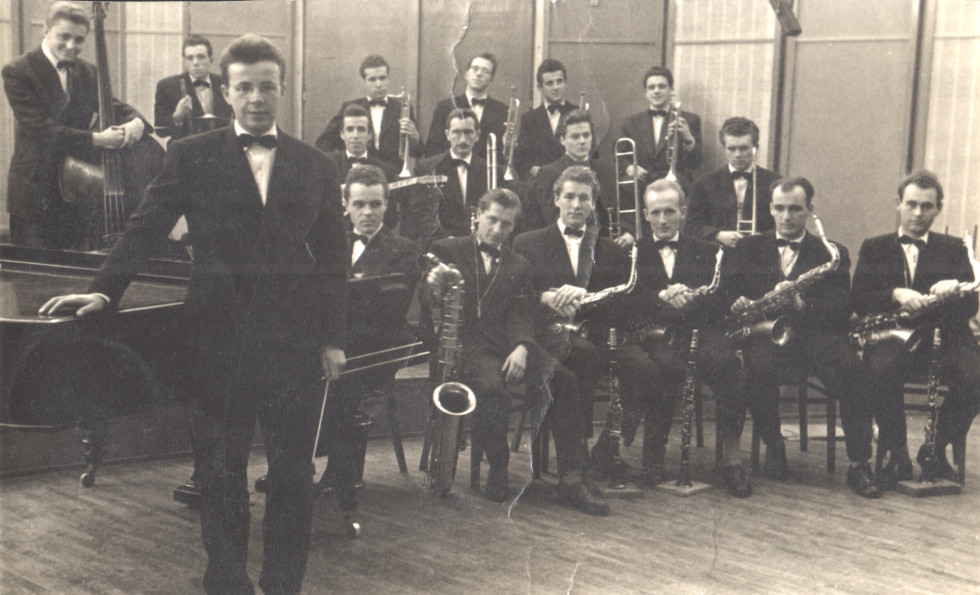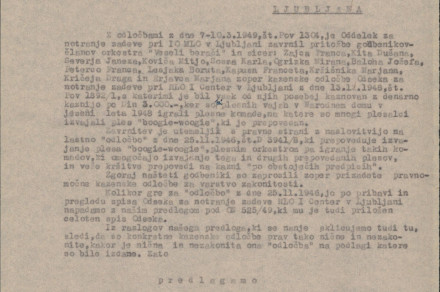»Indecent Dance 'Boogie-Woogie'«: on the Unlawful Prohibition of Performing Jazz and Popular Music
Ljubljana, April 20, 1949
Original, typescript, 1 page
Reference code: SI AS 353, Vrhovno državno tožilstvo Republike Slovenije, fasc. 2, Dopis namestnika javnega tožilca LRS Ministrstvu LRS za notranje zadeve, 20. 4. 1949

Veseli berači Orchestra in the 1950/51 season. Borut Lesjak, then conductor of the orchestra, is standing at the piano. | Author Osebni arhiv Primož Kristan
On April 20, 1949, the then Deputy Public Prosecutor of the People's Republic of Slovenia, Martin Žalik, sent a letter to the Ministry of the Interior, addressing the punishment of the members of the orchestra Veseli berači (Merry Beggars), who had been penalized in the autumn of 1948 for playing boogie-woogie. The American music genre jazz (and popular music that »reeked of jazz«) was labelled by the post-war authorities of the Federative People’s Republic of Yugoslavia as »imperialistic« and thus inappropriate music.
During the first few months after the Second World War, jazz musicians had encountered no problems when performing jazz. The turning point was the concert of the Dance Orchestra of the Radio Ljubljana, the predecessor of today's Big Band RTV Slovenia, which is celebrating its 80th anniversary this year. Soon after the war (most likely already in 1945), the orchestra performed arrangements from repertoires of American jazz orchestras at a concert in Belgrade. Although the audience was thrilled with its performance, the same could not be said for the prominent political figures of the time. The conductor of the jazz orchestra, Bojan Adamič, was after the concert summoned to appear before the Central Committee of the Communist Party of Yugoslavia and upon returning to Ljubljana, the orchestra was not allowed to perform jazz for several years. At dances where dance orchestras played, there were supervisors patrolling the venues to see if appropriate music was being performed and appropriate dances were being danced. At the time, a popular dance among the youth was the so-called »tržačan« (name given to boogie-woogie dance) – a dance whose pace and hard rhythm made it inappropriate in the eyes of the authorities.
In the autumn of 1948, the orchestra Veseli berači played at dance rehearsals held at the National Home in Ljubljana (today’s seat of the National Gallery). Since some of its members were at the time playing in Ankaran, the orchestra performed with a reduced lineup consisting of trumpeters Dušan Kit, France Kapus, and Drago Kričej, trombonist Marjan Erjavec, saxophonist Franc Zajc, Mitja Kovič, Karel (Ati) Soss, Jože Baloh, and Borut Lesjak, guitarist Marjan Kržišnik, pianist Miran Ogrizek, double bassist Franc Peterca, and drummer Janez Sever. Included in their repertoire was the Italian pre-war song »Ho imparato una canzone«, which of course was not a jazz song, but it did have a rhythm that encouraged the »tržačan« dance. According to Kapus, the young people in attendance enthusiastically stomped their heels, when all of a suddenly »a member of the League of Communist Youth of Yugoslavia appears on the stage and stops the music«. »The people seemed to have had enough and began throwing paper cups in the direction of the man who stopped the music« remembered Sever. »And then we clear away our sheet music and continue to play our set, which was in fact ‘more harmful’ (jazzier). But the whole thing did not end there, it was actually brought to the attention of the internal affairs department for public order and peace, and we were issued a formal ruling« added Kapus.
On December 13, 1948, each of the mentioned orchestra member received a penalty decision which stated that »having played as a member of the orchestra Veseli berači for dance rehearsals at the National Home this year, he is guilty of frequently playing different songs that encouraged dancers to dance the indecent dance 'bogie wogie', which is prohibited. He is fined 3,000 dinars.« Band members tried to defend themselves, saying that they were not responsible for what dancers chose to dance, but the Department of Internal Affairs at the District People's Committee I Centre Ljubljana replied that a band »was also responsible for the proper conduct at a dance, since it has an option to stop playing a song and so end the dance as well, but Veseli berači chose not to do this and instead even encouraged this dance.« Each member of the orchestra Veseli berači had to pay a fine of 3,000 dinars, which was a considerable sum of money at that time. Their fee for playing was only 120 dinars per member, so they had to borrow the difference. The members lodged an appeal on the penalty decision, but the appeal was dismissed, so they decided to file a request for the protection of legality. The Public Prosecutor's Office then determined that penalty decisions received by the musicians in Veseli berači were »as null and unlawful as was the 'decision' [about the prohibition of boogie-woogie, author's note] based on which they were issued.« The Prosecutor's Office suggested the Ministry declare the penalty decisions null and void. If, however, it is later determined that an offence against public peace and order had indeed occurred, the Ministry should »order /…/ new administrative-penal procedure for offense against public order and peace according to the principle of administrative law.«
Veseli berači was an orchestra formed after the Second World War. It was made up mostly of pupils and students enthusiastic about jazz and swing and was in a way a continuation of the orchestra of the same name founded and led in 1939 by Oton Jugovec. During the year the orchestra performed mostly at dances that were being held at the National Home, and during summer they played in resorts like Bled and Ankaran. Ranked as the second-best dance band in Ljubljana – placed only after Dance Orchestra of the Radio Ljubljana – Veseli berači functioned as a sort of training ground for future members of the Dance Orchestra of the Radio Ljubljana, with many of its best musicians joining the latter after a few years of playing in Veseli berači. Among them were Marjan Erjavec, Borut Finžgar, Franc Jagodic, Jože Kampič, Franc Košir, Borut Lesjak, Janez Martinc, Albert Podgornik, Ati Soss, and Mik Soss. In 1948, the leader of the orchestra became clarinetist and saxophonist Ati Soss, and after his departure to the Dance Orchestra of the Radio Ljubljana, leadership was taken over by saxophonist and pianist Borut Lesjak, who lead the orchestra until its disbandment in October 1951.
Izak Špajzer
- Interview of the author with Franc Kapus, March 22, 2019, the transcript of the interview is kept by the author.
- Penalty decision of the Department of Internal Affairs at the District People's Committee I Centre Ljubljana, no. 1892/l-Or, December, 13, 1948, kept by Franc Kapus.
- Dnevne vesti. In: Slovenski poročevalec 12 (1951), no. 256, p. 3.
- Antič, Igor: V prvi vrsti pa funkcionarji mrkih obrazov. In: Delo: Sobotna priloga 44 (2002), no. 79, p. 28.
- Gabrič, Aleš: Izginjanje jazza iz slovenske glasbene scene po drugi svetovni vojni. In: Prispevki za novejšo zgodovino 49 (2009), no. 1, pp. 293–304.
- Kumer, Marko: Jazz Ars: Ati Soss. Ljubljana: RTV Slovenija. Predvajano na Programu Ars, October 7, 2016.
- Luković, Petar: Večni fant s trobento: paberki iz življenja in dela Bojana Adamiča, 2. del. In: Nedeljski dnevnik 27 (1988), no. 317, p. 25.
- Sever, Janez: Nekoč so bili Veseli berači. In: Stop 13 (1980), no. 4, p. 55.
- Volčič, Mitja: Tudi nekoč je bila glasba – Veseli berači in Ati Soss. In: Stop 3 (1970), no. 26, p. 14.


